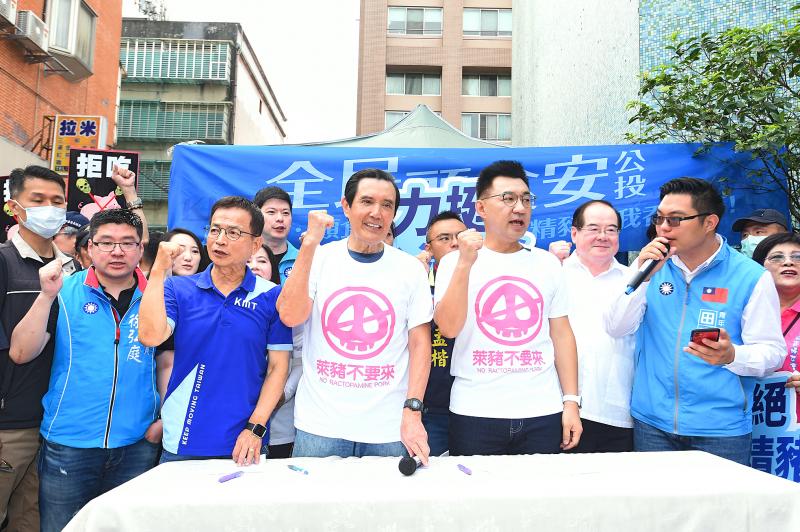The Chinese Nationalist Party (KMT) yesterday began a nationwide drive to drum up support for its proposed referendum to ban imports of US meat products containing ractopamine.
While attending events in Taipei and New Taipei City, KMT Chairman Johnny Chiang (江啟臣) wore a shirt featuring a pink skull and the text “no ractopamine pork” in Chinese characters.
Joined by former president Ma Ying-jeou (馬英九), Chiang shouted slogans and said that President Tsai Ing-wen (蔡英文) was “going against the international trend” on the importation of meat containing ractopamine and “turning her back on public opinion.”

Photo: Fang Pin-chao, Taipei Times
The leanness-enhancing additive is banned for use in pigs in Taiwan due to health safety concerns.
Tsai on Aug. 28 announced that the government would set maximum residue limits for ractopamine in pork, allowing it to be imported from the US, satisfying a key US demand to begin talks on a trade deal.
Minister of Health and Welfare Chen Shih-chung (陳時中) on Saturday last week unveiled the ministry’s residue limits for US pork containing the additive, which are scheduled to take effect on Jan. 1 next year.
Chiang said that the KMT would submit a petition for a referendum to prevent the importation of US pork as a response to Tsai’s use of an executive order to lift the ban.
“Take charge of your own health, and take charge of your own food safety,” Chiang said, in a bid to spur public support.
“Meat should not have anything added to it that is harmful to your body. Let us protect Taiwanese pork,” he said.
Ma said that about 60 percent of US pork is produced without the use of ractopamine, as the US hopes to sell it to markets in Europe, Russia and China.
“Tsai says that critics of her lifting the ban do not understand global trends, but it is she who does not understand the trends. Out of 197 countries worldwide, 160 do not use ractopamine,” Ma said.
About 60 percent of Taiwanese are opposed to importing such meat, he said.
“It’s not that we reject all US pork, we only reject imports that contain ractopamine,” he said.
Referring to Tsai as a “dictator,” Ma added: “Who did she consult with before lifting the ban on US pork?”
The KMT hopes to act quickly on the petition to have the proposed referendum ready for Aug. 28 next year, the next possible date for a referendum, Chiang said, adding that it aims to submit the first-stage petition to the Central Election Commission in the next few days.
“We hope our referendum will not get stalled by the commission, and that it will let us quickly move on to the second stage,” he said.
The referendum proposal asks: “Do you agree to a total ban on the importation of pork and related products containing leanness enhancing additives (ractopamine and other beta agonists)?”
Under the Referendum Act (公民投票法), referendums can take place every two years.
The act stipulates that a number equal to 1.5 percent of the voters in the most recent presidential election — about 289,000 people based on the turnout in January — must sign a petition for a national referendum to be held.
There were 19,311,105 eligible voters in the Jan. 11 presidential election, according to data from the CEC.
Additional reporting by Ho Yu-hua and CNA

Taiwanese can file complaints with the Tourism Administration to report travel agencies if their activities caused termination of a person’s citizenship, Mainland Affairs Council Minister Chiu Chui-cheng (邱垂正) said yesterday, after a podcaster highlighted a case in which a person’s citizenship was canceled for receiving a single-use Chinese passport to enter Russia. The council is aware of incidents in which people who signed up through Chinese travel agencies for tours of Russia were told they could obtain Russian visas and fast-track border clearance, Chiu told reporters on the sidelines of an event in Taipei. However, the travel agencies actually applied

Japanese footwear brand Onitsuka Tiger today issued a public apology and said it has suspended an employee amid allegations that the staff member discriminated against a Vietnamese customer at its Taipei 101 store. Posting on the social media platform Threads yesterday, a user said that an employee at the store said that “those shoes are very expensive” when her friend, who is a migrant worker from Vietnam, asked for assistance. The employee then ignored her until she asked again, to which she replied: "We don't have a size 37." The post had amassed nearly 26,000 likes and 916 comments as of this

New measures aimed at making Taiwan more attractive to foreign professionals came into effect this month, the National Development Council said yesterday. Among the changes, international students at Taiwanese universities would be able to work in Taiwan without a work permit in the two years after they graduate, explainer materials provided by the council said. In addition, foreign nationals who graduated from one of the world’s top 200 universities within the past five years can also apply for a two-year open work permit. Previously, those graduates would have needed to apply for a work permit using point-based criteria or have a Taiwanese company

US President Donald Trump said "it’s up to" Chinese President Xi Jinping (習近平) what China does on Taiwan, but that he would be "very unhappy" with a change in the "status quo," the New York Times said in an interview published yesterday. Xi "considers it to be a part of China, and that’s up to him what he’s going to be doing," Trump told the newspaper on Wednesday. "But I’ve expressed to him that I would be very unhappy if he did that, and I don’t think he’ll do that," he added. "I hope he doesn’t do that." Trump made the comments in